The Pros and Cons of Copper vs Stainless Steel Wort Chillers for Homebrewing
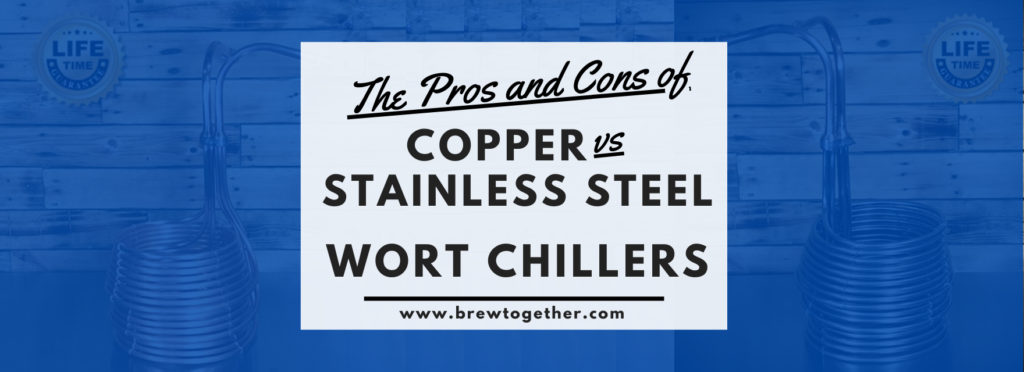

Throughout the course of your homebrewing career, you may find that you pass through several phases of brewing process, complexity, and equipment. Homebrewers generally begin with small 1-2 gallon batches brewed with malt extract in a stock pot on a kitchen stove. After a few brews, it is common to begin increasing batch sizes to 5 gallons, or to switch to all-grain brewing. As batch sizes and brewing process complexity increases, brewers need to purchase additional equipment. As that happens, it can become increasingly difficult to use a kitchen sink full of ice and water to cool down your wort to yeast pitch temperatures. When that happens, most homebrewers start with an inexpensive immersion wort chiller, but must make a choice: do you prefer copper vs stainless steel wort chillers?
There are a few different types of wort chillers (click here to see our guide to the differences between them), but in this article we will focus on immersion chillers. Immersion chillers are usually made from one of two most common materials: copper or stainless steel. Copper and stainless steel wort chillers each have their own pros and cons that should be considered when deciding which is the right chiller for you. Need some help deciding? Here is an overview of the pros and cons of copper vs stainless steel wort chillers for homebrewing!
The Pros and Cons of Copper Wort Chillers
- Pros
- Copper wort chillers have the fastest chill times because they have a higher heat exchange rate than stainless steel.
- For example, my JaDeD Scylla Copper Immersion Wort Chiller can bring a 5-gallon batch of wort in my Anvil Foundry from boiling to pitch temperatures in under 5 minutes!
- Copper wort chillers are generally less expensive than stainless steel wort chillers, all things being equal.
- Copper is easier to bend, solder, and weld, making it easier to customize and repair copper wort chillers.
- The small amount of copper that is transferred into your wort is good for the health of the yeast.
- Copper chillers are easy to clean after use, and develop an oxide layer that protects it from corrosion. Note: This oxide layer gives the copper a “dull” appearance, and there is no need to clean/polish a copper chiller to a shine.
- Copper wort chillers have the fastest chill times because they have a higher heat exchange rate than stainless steel.
- Cons
- If not properly stored, copper wort chillers can develop a blue-green toxic patina called Verdigris (the stuff that makes the Statue of Liberty green). It can be removed by cleaning the chiller with a Star San solution, though.
- Because of the risk of developing Verdigris, copper wort chillers are a little bit more work to maintain than stainless steel wort chillers.
- Copper is not as strong as stainless steel, leaving copper wort chillers more susceptible to bending and damage than stainless steel chillers.
The Pros and Cons of Stainless Steel Wort Chillers
- Pros
- Stainless steel wort chillers are extremely strong and rigid, making them much less susceptible to damage than copper wort chillers.
- Unlike copper wort chillers, stainless steel wort chillers are almost completely resistant to corrosion, making storage environment less of a concern.
- Stainless steel wort chillers are very easy to clean after use.
- Stainless steel wort chillers are shiny and look nice sitting next to a bunch of other shiny stainless steel equipment.
- Cons
- Stainless steel wort chillers do not chill wort as fast as copper wort chillers due to a lower heat exchange rate.
- Stainless steel chillers are generally a little more expensive than copper wort chillers, but not by as much as they used to be.
- Unlike copper wort chillers, stainless steel chillers do not add the small amount of copper to the wort that is beneficial for the yeast.
The Pros and Cons of Copper vs Stainless Steel Wort Chillers Infographic
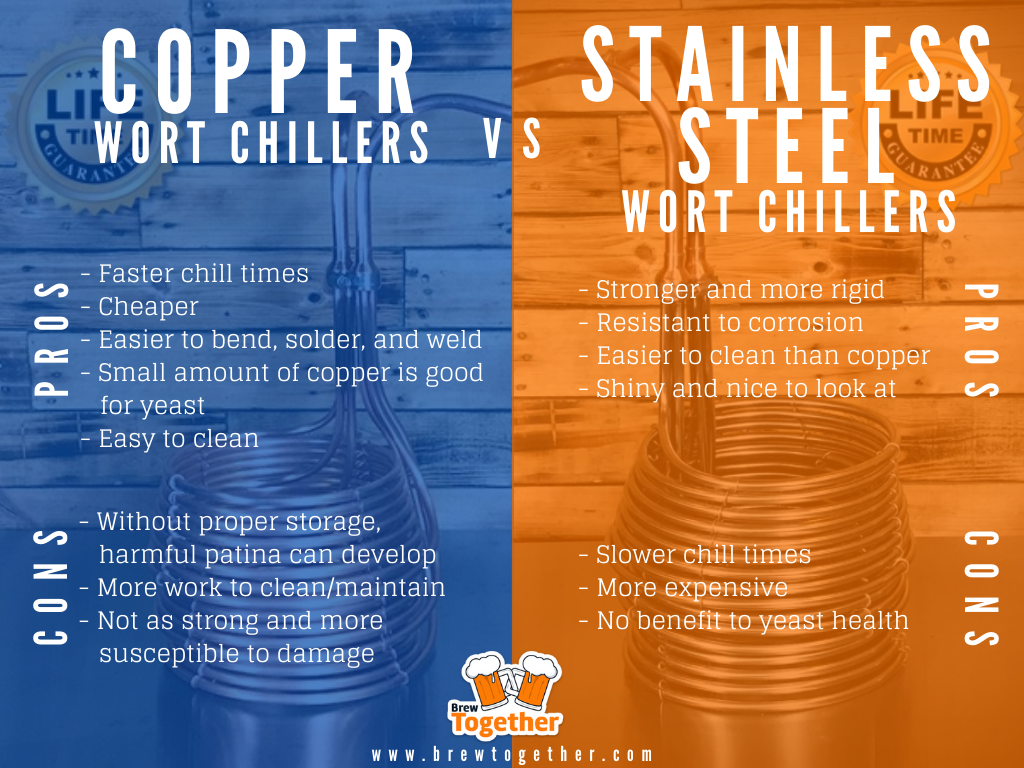

Copper vs Stainless Steel Wort Chillers for Homebrewing
So which is the best? It depends on which of the above pros and cons are most important to you! Overall, after years of using both copper and stainless steel immersion chillers, we prefer copper, especially the JaDeD Hydra for large kettles or the JaDeD Scylla for electric all-in-one brewing systems. In our opinion, the speed of chilling from the copper wort chiller is worth giving up the durability and easy maintenance of a stainless steel wort chiller. Not sure that an immersion chiller is the way to go? Click here to check out our guide to the best wort chillers for homebrewing, which includes an overview of the types of wort chillers.
Affiliate Disclosure: BrewTogether is a participant in the Amazon Services LLC Associates Program, an affiliate advertising program designed to provide a means for us to earn fees by linking to Amazon.com and affiliated sites. BrewTogether is also a participant in an affiliate program with MoreBeer, our favorite online homebrewing equipment/ingredients retailer. Some of the links in this article are affiliate links, which means that if you choose to make a purchase after clicking the link, I will earn a small commission at no additional cost to you. Please feel free to reach out with questions. Thank you for your support!
Thanks for Reading!
Have a strong opinion as to why copper vs stainless steel wort chillers are the best choice? Still have questions about which you should choose? Leave a comment below or post in the forums!
Thank you for reading! If you like this article, please share it with your friends using the social media share buttons below!
If you’re not a member of BrewTogether, we’d love for you to join! BrewTogether is completely free, and signing up is easy! Click here to join!


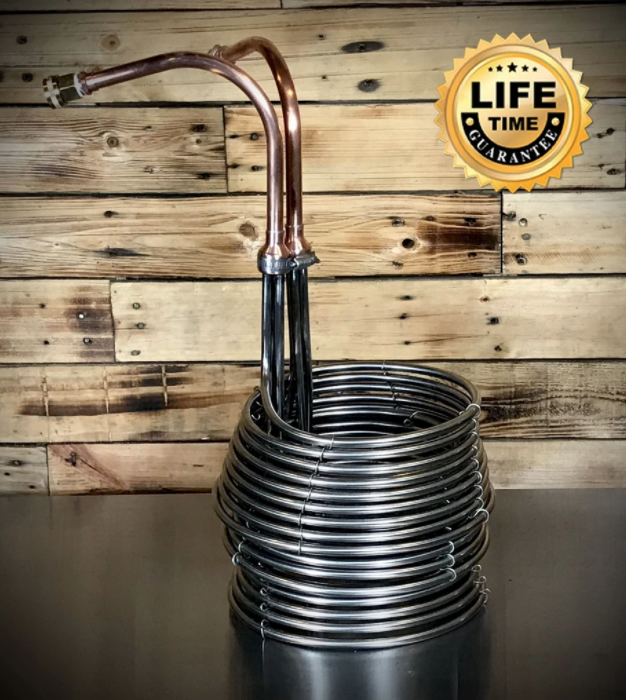


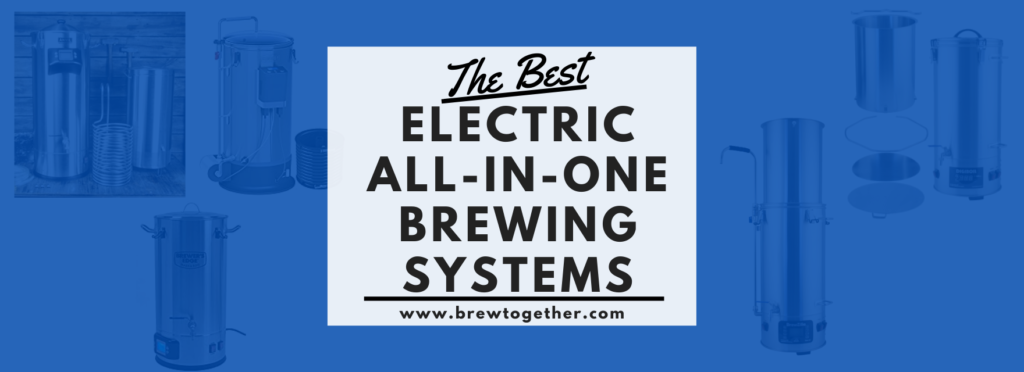
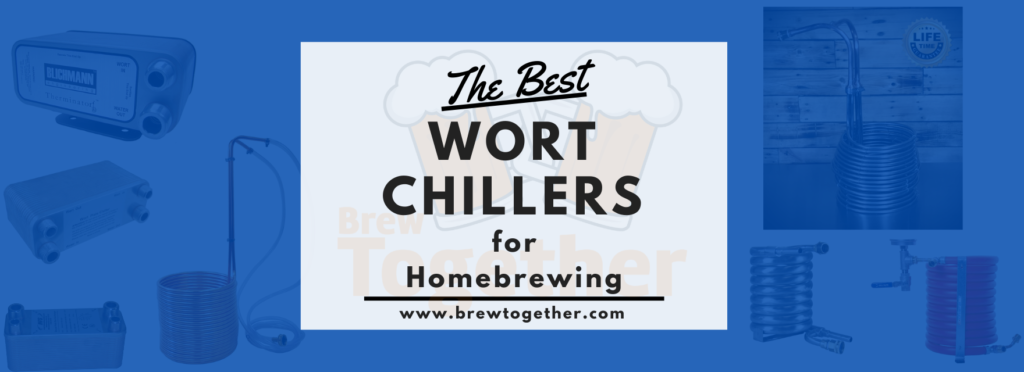



[…] Source: https://brewtogether.com/2021/04/29/copper-vs-stainless-steel-wort-chillers/ […]